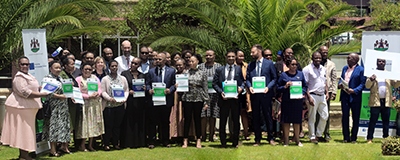By Liapeng Raliengoane
MASERU – In its efforts towards having in place, a comprehensive and well-coordinated social protection system that has sufficient capacity to address the socio-economic needs of vulnerable and under-privileged, the government of Lesotho launched the National Social Protection Strategy II (NSPS 2021-2031) yesterday in Maseru.
The Ministry of Gender, Youth, Sports, Arts, Culture and Social Development Principal Secretary ‘Mantšenki Mphalane indicated that this strategy builds upon the achievements and lessons learned from its predecessor, the National Social Protection Strategy (NSPS 1), which adopted the life-cycle approach to social protection.
“The approach has proved to be helpful in responding to the needs of our clientele since it covers all stages of life from pregnancy or early childhood, to school age or youth, to working age, old age and disability,” she highlighted.
She added that NSPS I capitalized on the core social assistance programmes of which the main focus was on reducing child poverty, while children in Lesotho are most at risk of poverty. “The social protection has not been inclusive or gender-sensitive and has created insufficient opportunities for the working age population, in particular, the unemployed rural youth.”
Mphalane also added that social protection, as defined in the NSPS II (2021-2031), is a set of policies and programmes aimed at preventing, reducing and eliminating economic and social vulnerabilities to poverty and deprivation. It envisions a decent and dignified life for all Basotho, free from poverty and hunger that allows them to share in the benefits of national economic growth with the objectives to among others: expand core protective social protection programmes that provide relief from deprivation for poor and vulnerable households across all life cycles.
She expressed gratitude to the European Union for financial support and the United Nations children’s Fund (UNICEF) for technical support throughout the development of NSPS II.
UNICEF Country Representative Deepak Bhaskaran applauded the Government of Lesotho and, in particular, the Ministry of Gender, Youth, Sports, Arts, Culture and Social Development for the strategic leadership that was provided during the drafting and approval of this document.
“We count on this continued leadership to successfully implement the strategy from now until 2031. Beyond the implementing line ministries, UNICEF also counts on the broader government to allocate adequate financial resources to implement this strategy effectively,” Bhaskaran highlighted.
He explained that as of 2018, 2 in 5 Basotho children are multi-dimensionally poor and many of these children’s lives have changed significantly over the past 15 years because of Social Protection and Social Assistance, which has helped by giving urgent financial assistance and connecting vulnerable people with necessary resources through programs.
He further reiterated UNICEF’s commitment to supporting the Government of Lesotho to implement this strategy, realize its set objectives and strengthen the social protection system to improve the lives of all Basotho children, their families and their communities.
The European Union (EU) Delegation to Lesotho Head of Cooperation Mario Giuseppe Varrenti expressed that Covid-19 continues to have socio-economic effects and these effects are also exacerbated by climate change. He thus, said social protection is what stands between these circumstances and children. He said NSPS II is indeed a great investment.
According to the Lesotho National Social Protection Strategy II (2021-2031), the political and financial commitment to social protection in Lesotho is high. Social protection as a tool holds the potential to reduce poverty and inequality among its direct beneficiaries but can also promote economic growth within local communities and improve social cohesion and the endorsement of human rights. To achieve such a wide-ranging impact, the social protection system needs to extend beyond providing direct relief from deprivation (protect). It needs to include measures that avert deprivation (prevent); promote real capabilities and income (promote); that address concerns of social equity and exclusion (transform), and; that can easily respond to shocks (shock-response).
In terms of poverty and vulnerability, Lesotho remains one of the most unequal countries in the world. Almost half of the population of Lesotho is poor (49.7 percent) and almost one quarter (24.1 percent) is extremely poor, living below the food poverty line. A strong rural and urban divide marks poverty with more than 80 percent of the poor living in rural areas.
Children are most at risk of poverty with 65 percent being multi-dimensionally poor and over one quarter being orphans. Health and education are less accessible for poor households living in rural areas. Unemployment, especially among rural youth, is high, and almost a quarter of the population has HIV/AIDS. Lesotho is highly vulnerable to shocks, such as droughts, food price increases and the recent COVID-19 pandemic. The ability of households to cope with shocks varies by their level of poverty and the vulnerabilities that they face.


